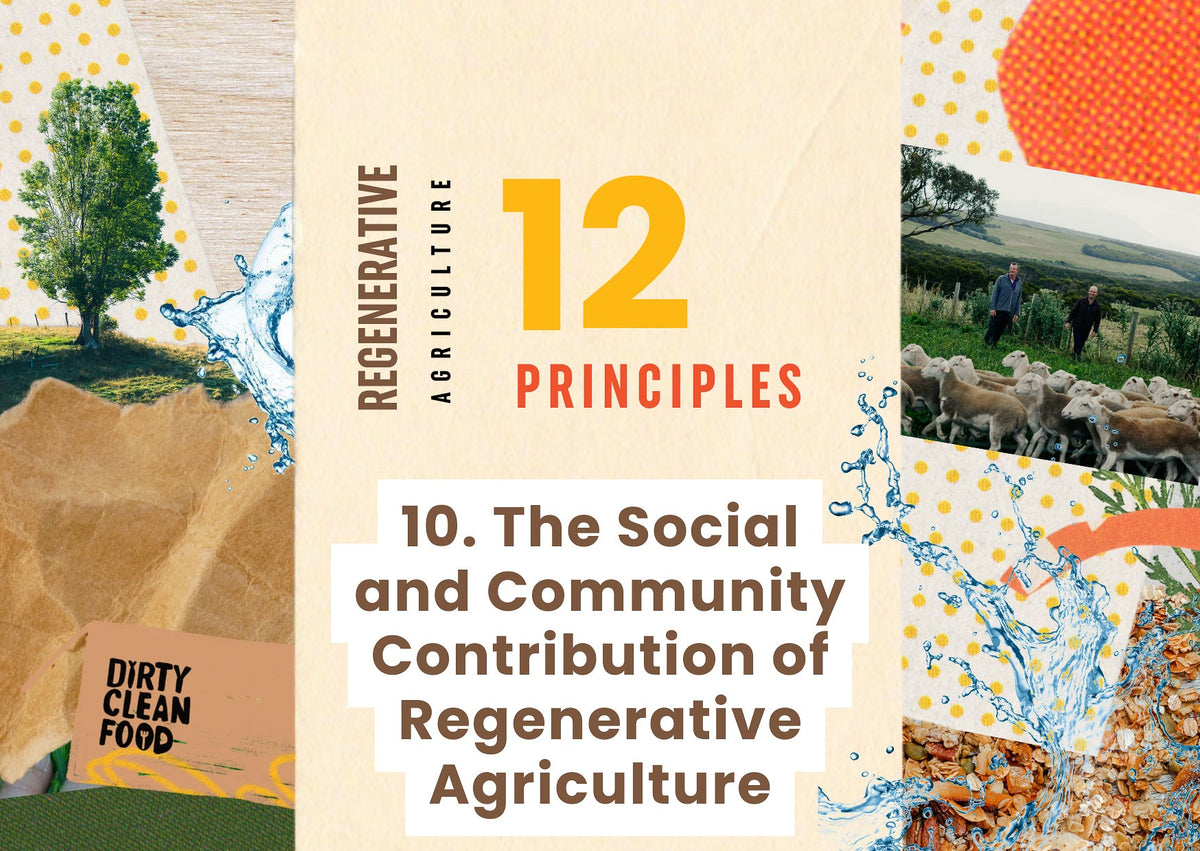
Regen Ag #10 - The Social and Community Contribution of Regenerative Agriculture
|
Time to read 3 min
|
Time to read 3 min
Welcome to our 12 Principles of Regenerative Agriculture series- where we define "regen ag" and show you how regenerative farming changes the planet, the system, and our food.
In the ever-evolving landscape of agriculture, regenerative agriculture stands out not only for its environmental benefits but also for its profound social and community contributions. Beyond soil health and biodiversity, regenerative agriculture fosters connections among individuals, communities, and the land they steward. Here, we delve into the essence of regenerative agriculture's social and community contribution, exploring its impact on livelihoods, empowerment, and shared prosperity. Each of the practices or themes below feature in our Regenerative Farm Plan, with each of our farmers filling out how they are contributing to their community.
Regenerative agriculture thrives on collaboration, and on-farm partnerships exemplify this ethos. From hosting educational workshops to collaborating with local businesses, regenerative farmers actively engage with their communities and industries to promote sustainable practices. These partnerships extend beyond mere transactional relationships, fostering a sense of shared responsibility and mutual support. By working together, farmers, businesses, and community members co-create solutions that benefit both people and the planet.
Central to the ethos of regenerative agriculture is a commitment to ethical labor practices. Recognizing the invaluable contribution of farmworkers, regenerative producers prioritize fair wages, safe working conditions, and equitable opportunities for all. By adhering to rigorous labor standards and fostering a culture of respect and dignity, regenerative farms serve as models of ethical employment practices within the agricultural industry. This commitment not only enhances worker well-being but also strengthens the social fabric of rural communities.
Regenerative agriculture serves as an engine for local economic growth and employment opportunities. By investing in regenerative practices, farmers create demand for skilled labour, ranging from soil health specialists to agroecology educators. Moreover, the localization of food systems promoted by regenerative agriculture generates additional employment across the value chain, from food processing to distribution. As a result, regenerative farming not only revitalizes rural economies but also fosters a sense of pride and belonging within local communities.
Producer Involved in Community Groups or Donates to Worthwhile Causes: Regenerative farmers are deeply rooted in their communities, actively participating in local organizations and supporting meaningful causes. Whether a member of their local volunteer firefighing organization, participating in community sport, school p&c, or donating surplus produce to those in need, regenerative producers demonstrate a commitment to social responsibility. By investing in the well-being of their communities, these farmers cultivate trust and goodwill, forging stronger bonds of solidarity and reciprocity.
Regenerative farmers are deeply rooted in their communities, actively participating in local organisations and supporting meaningful causes. Whether a member of their local volunteer firefighing organization, participating in community sport, school p&c, or donating surplus produce to those in need, regenerative producers demonstrate a commitment to social responsibility. By investing in the well-being of their communities, these farmers cultivate trust and goodwill, forging stronger bonds of solidarity and reciprocity.
Regenerative farmers understand the importance of collective action in driving systemic change. That's why many producers actively engage with regenerative agriculture networks and industry groups. By sharing knowledge, exchanging best practices, and advocating for policy reform, regenerative farmers amplify their impact and influence beyond the farm gate. Whether participating in regenerative agriculture conferences or collaborating on research initiatives, these producers contribute to the growth and mainstream adoption of regenerative practices, shaping the future of agriculture for generations to come.
In conclusion, the social and community contribution of regenerative agriculture transcends mere agricultural practices; it embodies a philosophy of interconnectedness, stewardship, and shared prosperity. Through positive partnerships, ethical labor practices, local economic development, community engagement, and collective action, regenerative farmers demonstrate the transformative potential of agriculture as a force for social and environmental regeneration. As we navigate the challenges of the 21st century, regenerative agriculture offers a path forward—a path rooted in resilience, reciprocity, and respect for the planet and all its inhabitants.
‘Regenerative agriculture is an ecological approach to farming that allows landscapes to renew themselves.’



